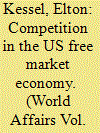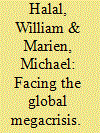| Srl | Item |
| 1 |
ID:
108649


|
|
|
|
|
| Publication |
2011.
|
| Summary/Abstract |
Elton Kessel describes the role of competition in a free market economy, contrasting its place in the financial sector as financial firms move from a monopoly position in initiating innovative financial procedures to an oligopolistic position as competitors adopt the same procedures. The motivation is abnormal profits. Enormous profits among a relatively small number of firms have led to political power making it unlikely for states or international organisations to secure legislative control of these firms.
|
|
|
|
|
|
|
|
|
|
|
|
|
|
|
|
| 2 |
ID:
108657


|
|
|
|
|
| Publication |
2011.
|
| Summary/Abstract |
With ecological and financial crises threatening the world, the authors of this paper undertook a survey of differing views of experts and others in evaluating the severity of the Global Megacrisis and the probability of four alternative scenarii. William E Halal and Michael Marien sketch the scenarii, present preliminary results and conclude with two analyses-one guardedly optimistic, the other decidedly pessimistic.
|
|
|
|
|
|
|
|
|
|
|
|
|
|
|
|
| 3 |
ID:
108650


|
|
|
|
|
| Publication |
2011.
|
| Summary/Abstract |
The role of genders in contemporary societies is evolving under pressure from cultural, economic, religious and socio-political factors. However, gender categories are more fluid than the women/men dichotomy. They exist on a continuum between the two "ideal types" of females and males. Most people exhibit a combination of binary opposing female and male traits. Ivana Milojevic lays out three possible scenarii for the future-continued male-female polarity, unisex androgyny and multiple gender diversity. She points out that so far the drive for equality between the sexes has manifested in women assuming roles traditionally held by males, whereas few men carry out "feminine" tasks, which are part of the mostly non-monetised "love-economy".
|
|
|
|
|
|
|
|
|
|
|
|
|
|
|
|
| 4 |
ID:
108655


|
|
|
|
|
| Publication |
2011.
|
| Summary/Abstract |
Rob Van Kranenburg focuses on the premise that current national and global vertical institutions will break under the weight of the internet based actions of ever-growing groups of people organising themselves on all kinds of specific topics. The enabler of this new political and socio-economic reality has been called the Internet of Things. It will lend greater significance to sudden events or "black swans" and radically democratise societies in an environment where goods, things and people can be addressed in both analogue and digital ways.
|
|
|
|
|
|
|
|
|
|
|
|
|
|
|
|
| 5 |
ID:
108647


|
|
|
|
|
| Publication |
2011.
|
| Summary/Abstract |
After noting characteristics of how futurists view change and stages of change (A-B-C-D), Linda Groff examines sixteen different models with examples, of the processes transforming our world. These collectively cover many issues in the future studies field, issues that policymakers in different areas must address. This review includes both older and newer models of change. Older models, from different cultures and time periods, led to more predictable views of the future, while many newer models incorporate uncertainty and unpredictability, where gradual change within a system suddenly shifts, leading to either the breakdown of the system or a breakthrough to a new system level or both. Clarifying not only trends, but also models of change underlying the trends, could help policymakers make more informed policy decisions and better prepare for dealing with uncertainty in our contemporary world and in the future.
|
|
|
|
|
|
|
|
|
|
|
|
|
|
|
|
| 6 |
ID:
108652


|
|
|
|
|
| Publication |
2011.
|
| Summary/Abstract |
This article by Mikhail Baydakov, Yury Gromyko and Paolo Raimondi is adapted from a report on the symposium, "Strategic Scenarii: Social and Economic Effects of Modernisation-From 'Smart Devices' to 'Smart Social Networking Services' as a subject of 'Smart Investments'", Moscow, 28 February-2 March 2011. It proposes a new strategy for integrated technological modernisation based on Russia's R&D strength in order to trigger and lead the next industrial revolution, in cooperation with the financial and manufacturing centres of other countries. The suggested policy goes beyond mere technology transfer or purchase of manufacturing processes and knowhow to promote genuinely indigenous research and discovery for economic prosperity and holistic human development.
|
|
|
|
|
|
|
|
|
|
|
|
|
|
|
|
| 7 |
ID:
108648


|
|
|
|
|
| Publication |
2011.
|
| Summary/Abstract |
Ismail Shariff critically evaluates the effects of the ongoing phenomenon of globalisation, from both the economic and socio-political angles. Although its basic framework was established during the nineteenth century, globalisation has come of age since the breakdown of the Soviet Union. All countries are now more or less forced to implement policies that include economic deregulation and openness to investment and trade in a stable currency. Yet the major powers use protectionist mechanisms at the expense of poorer countries, while promises of increased prosperity for all are not coming true-indeed markets need to be regulated by national or regional political institutions.
|
|
|
|
|
|
|
|
|
|
|
|
|
|
|
|
| 8 |
ID:
108654


|
|
|
|
|
| Publication |
2011.
|
| Summary/Abstract |
José Luis Cordeiro gives a summary of the global evolution of telecommunications. The invention of the telephone allowed the immediate and simultaneous interconnection of many people around the world for the first time in human history. This had many benefits, including the unprecedented rates of economic growth experienced in the last century and the twentieth century may be called the "Age of the Telephone". This article also considers some implications of an increasingly interconnected world, like faster development and knowledge creation. New mobile forms of communication in the twentyfirst century are fast replacing old fixed landline telephones, bringing better, cheaper, faster and more efficient ways to interact in our rapidly connecting planetary civilisation.
|
|
|
|
|
|
|
|
|
|
|
|
|
|
|
|